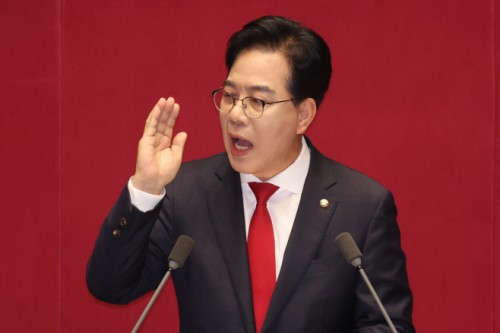 |
| Song Eon-seok, floor leader of the People Power Party, delivers a policy speech during a National Assembly plenary session in Yeouido, Seoul, on September 10. / Source: Yonhap News |
At a National Assembly plenary session on September 10, People Power Party (PPP) Floor Leader Song Eon-seok urged President Lee Jae-myung and the ruling Democratic Party to “stop the duplicitous governance that preaches cooperation while fixating on crushing the opposition,” while simultaneously calling for cross-party cooperation. He sharply criticized the ruling bloc over the three special counsel amendment bills (insurrection, Kim Keon-hee, and the late Sgt. Chae), plans to create a special court for insurrection cases, a proposed $500 billion investment package for the United States, and the fast-tracking of contentious bills.
Song argued that the ruling party’s proposed special court for insurrection would be unconstitutional. “The Democratic Party has set up a ‘special committee to respond to the special counsel’ and is openly steering investigations. Now it seeks to install a ‘special court for insurrection.’ Unlike past special courts such as those for the Anti-People Activities Committee or the March 15 election fraud, this has no constitutional basis and is clearly unconstitutional,” he said. Targeting the ruling party’s prosecution reform drive, he added: “You gave both investigative and indictment powers to the CIO and special counsels—so why strip prosecutors of investigative authority? Look at the fallout from the railroaded ‘complete deprivation of prosecution powers’ at the end of the Moon administration. Ordinary people were harmed. What matters now is not speed but direction.” He proposed creating a bipartisan Judicial Reform Special Committee to debate prosecution reform.
Emphasizing the need for a Fiscal Soundness Act and a comprehensive re-evaluation of government program costs via a zero-based budgeting approach, Song proposed forming a Tri-party Fiscal Reform Special Committee. “Under the Moon administration, the 40% debt-to-GDP red line was breached, ushering in the ‘1,000-trillion-won debt era.’ The Lee administration is now set to open an 1,800-trillion-won debt era by the end of its term,” he said. “Interest payments on government bonds will surge to 36.4 trillion won next year alone—hell’s gate is opening for public finances.”
Labeling the so-called Yellow Envelope Act and the third set of Commercial Act amendments as “a corporate guillotine” and “self-defeating economic policy,” Song called for corrective legislation. “The Yellow Envelope Act must clarify the definition and scope of ‘employer’ and of ‘industrial action.’ Like other advanced economies, we should ban unions from occupying key worksites and allow replacement workers during strikes to strengthen companies’ right to defend themselves,” he said. On commercial law, he urged codifying the “business judgment rule,” updating the crime of breach of trust to reflect economic realities, and introducing poison pills and dual-class shares “as many advanced countries do” to help defend management rights. He also demanded repeal of the three broadcasting laws and the creation of a Bipartisan Public Broadcasting Institutionalization Special Committee to restart media-reform talks from scratch.
On personnel hearings, Song warned: “If the president pushes ahead with appointing Choi Kyo-jin as deputy prime minister and education minister, we will complete a ‘government of criminal sovereignty’ with a combined 22 convictions across the president, prime minister and ministers.” He questioned whether the vetting system “has completely collapsed or never existed,” and—citing a litany of alleged disqualifiers such as abuse of power, plagiarism, slurs, sycophancy, conspiracy theorizing, DUI, conflicts of interest, real-estate speculation, borrowed-name holdings, “split” purchases, and serial delinquencies in fines and taxes—demanded an immediate end to “backroom hiring centered on a tiny circle of confidants” and the restoration of a proper public vetting system.
Addressing the recent South Korea–U.S. summit, Song referenced the detention of Korean employees at a Georgia battery-plant construction site and vowed to “closely monitor follow-up negotiations with the public.” He derided the summit as an “empty, chaff-filled meeting” and called the proposed $500 billion U.S. investment package an “unequal burden.” He pressed the government: “When will auto tariffs actually be lowered to 15%? Were market-opening demands on rice and beef truly blocked? What happened to the $350 billion investment package? Why was there no announcement on modernizing the alliance, including a recalibration of U.S. Forces Korea’s role? The public is frustrated.”
On North Korea policy, Song condemned the Lee administration’s approach as “one-sided puppy love,” urging stronger practical deterrence and a push to revise the ROK–U.S. nuclear cooperation agreement. He criticized former President Moon Jae-in for “playing spokesman for Kim Jong-un,” saying that effort yielded only “the demolition of the inter-Korean liaison office, missile provocations, and a breakdown in dialogue,” and accused the current administration of retracing “that disastrous path.” He listed actions—bans on leaflet launches, halting/lifting loudspeaker broadcasts and removing facilities, scaling back combined drills, keeping the North Korean human-rights report confidential, and stopping cross-border broadcasts—as “cards for negotiation” that the government had “surrendered,” only to receive “ridicule and contempt like ‘empty pipe dreams’ and ‘filthy lot.’”
Concluding, Song noted the agreement two days earlier among the president and party leaders to form a ruling–opposition livelihood council, and said, “Now it’s about execution. The PPP is ready to cooperate and has policy alternatives. The choice lies with the ruling party. We will put people’s livelihoods first and prove ourselves a competent policy party—before the ruling party does.”
Most Read
-
1
-
2
-
3
-
4
-
5
-
6
-
7





















